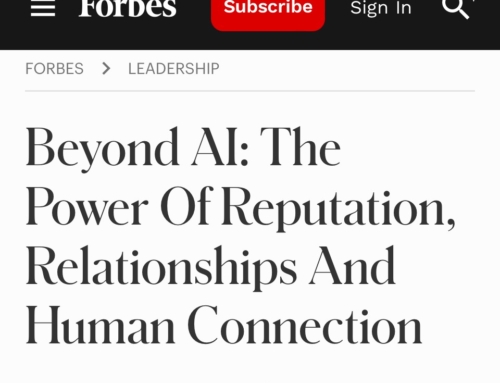As published in Forbes.
Lately, I have been thinking about what makes a leader in today’s world.
Are we leaders simply because others report to us, or because we are responsible for an area of the business? Are we leaders because we have a future vision that no one else seems to be able to see just yet? Or is the answer that we are only leaders when others are following? After all, how can we call ourselves leaders if, when we turn around, no one is following us or the initiatives we need them to support?
After much contemplation, I propose that a leader today is someone who sparks in us a desire to help.
In our networked, matrixed, dotted-lined, ever-changing organizational structures, a leader today must be a follower tomorrow, and vice versa. Therefore, we are not leaders simply because of our titles or responsibilities, nor are we leaders because we have a vision for the future. What makes us leaders is our ability to connect with others in a way that makes them want to help us.
I once received an email from a new colleague in Asia. This colleague needed information she hoped I could provide. However, before requesting the information, she must have first taken the time to learn about me, as her email began with a short, professional introduction but then quickly turned personal. She congratulated me on the arrival of my first child (could there be a better way to get my attention and create in me a desire to help?) and then took a sentence or two to share her experience of motherhood and her best wishes for me and my new family.
To say that her email struck a cord is an understatement. I forwarded it to another colleague, who had a similar, positive reaction. Together, we wondered whether her approach was a result of culture (my experience is that Asian cultures have a stronger tendency to first establish a relationship before turning to business) and we wished that more in North America understood the importance of doing so.
Although I had several other more pressing matters that morning, I placed her request at the top of my list and responded immediately. Why? Because I felt a connection—a very real, human connection to someone whom I had not yet met or even spoken to. It was as if this new colleague was an old friend, one that I would naturally promote to the front of my to-do list! Given the personal tone of her email, I was also sure my response would get a pleasant reception, another reason I replied to her before answering the many others on my list that day (others who, by the way, do not always respond so warmly). The result was that my new colleague obtained the information she needed quicker than others who might have made similar requests. She also established relationship equity with me, so that in the future, should she need my assistance, I would be more inclined to help.
Of course, merely asking about family when you could care less is inauthentic and will only detract from any relationship you seek to create. Leading today is never as simple as just do this or don’t do that. It’s about making a connection. This requires you to actually consider the other person: Who are they? How do they like to work? What would they most appreciate (i.e., what will make their day easier and/or better)? It’s about taking the time to try and understand the world of another, then operate more fully within it. Sometimes this means genuinely inquiring about another’s family, other times it means getting straight to business (so as not waste time when you know someone dislikes social chit-chat).
Many of us are maxed out by the demands of work and family and unfortunately, we often take out this stress on each other. After all, it has to go somewhere, right? However, by doing so, we only shoot ourselves in the foot. When we treat others poorly—a cold or sharp tone, an unnecessary cc to a colleague’s boss, or venting behind another’s back versus honoring the relationship by having the real conversation directly—we hurt ourselves in unseen ways. We might wonder why we were passed up for a promotion or why working with a colleague’s team members is always frustrating. And yet, we fail to take into account our own contribution to the situation. If we want to make our lives easier, we need only be easier to work with: a little friendlier, more consistently responsive, and eager to help.
Our ability to connect and create relationships trumps many other factors when doing business. Ample evidence shows that people simply want to work with other people they like, sometimes selecting a likable person or company over one that actually has more qualifications or a superior product. Consider for a moment your own personal and professional life as well as how you behave as a consumer. Do you find evidence of this?
Leadership today is about working extraordinarily well with and through others. As our organizational landscapes continue to change, how we connect with others remains paramount. Every interaction we have either contributes to a relationship or it detracts from it. When what we do detracts, the result is more work for us and fewer supporters— those who are willing to help us, and ultimately, follow us and the initiatives we want and need them to support.
So, food for thought: how likable are you? How much are the people you work with most closely willing to advocate on your behalf? When you reach out, how many seem eager to assist? How many truly have your back? These are questions to consider as today’s direct reports can quickly become tomorrow’s boss or client.






